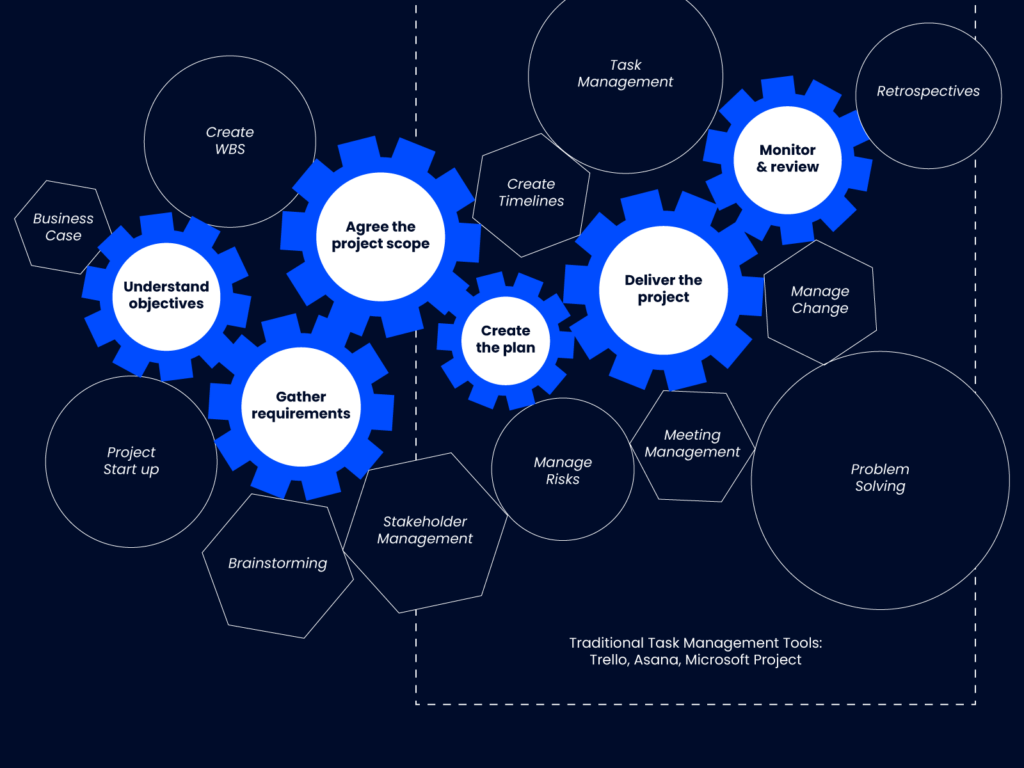Did you know the world record for juggling three balls is 12 hours? Well, if you’re managing multiple projects, you might feel like you deserve the world record for juggling. And, honestly, you might be right. Program management is a tough gig that requires you to keep track of all the details while still ensuring the big picture stays on track.
So what is program management, and how do you take care of multiple individual projects without losing your mind? Take a look at our breakdown for program and project management to learn how to streamline and prioritize your business objectives to ensure all your project goals are met.

What Does Program Management Mean?
Simply put, program management is the practice of managing a "program" or number of multiple, related projects that work together to create impact for a strategic initiative.
Program Management Vs. Project Management
Program and project management are often confused, but they’re not actually the same thing. Program management is all about the general process of leading a specific project towards completion, helping the team achieve business goals. It also generally involves managing multiple related projects that are linked together through various strategic initiatives.
Project management is more about focusing on a specific scope with a defined output. You might be running a project for years where the main focus remains the same, pushing a larger program forward through deliverables, strategy, and planning. Project managers do many of the things program managers do, including risk management and resource allocation, on a smaller scale.
Read about the differences between the project manager role and program manager role here.
Other Types of Management
Program and project management aren’t the only parts of a healthy strategic management hierarchy. You might also encounter project portfolio management, product management, and work management — all of which must work together seamlessly to ensure the success of the overall program.
Program Management Overview
Developing a program management process can be daunting because of the many roles and responsibilities you need to account for. However, depending on your organizational style and process, you may not need to incorporate every single one of these roles into your business strategy to ensure a successful program. Here are a few of the roles you may consider filling.
Program Manager
This role is the one in charge of life, the universe, and everything related to your program objectives. They should frequently be checking in with project teams and confirming that their work is still in-line with the overall strategy roadmap. A successful program manager should be:
- Managing expectations both below and above them
- Ensuring cohesive decision-making across all program goals
- Tracking metrics to mitigate risks and spot opportunities for growth
- Building resource management plans for the whole program
- Measuring real-time costs and resources
- Making sure team members are on the same page with executive buy-in
If you’re concerned about developing skilled program management office staff, you can explore project management certification programs, including those from the Project Management Institute (PMI). With or without certifications, you can still ensure program management professionals (PMP) that know what they’re doing through on-the-job experience.
Sponsor
This role is one filled by the most senior member of the program organization. A sponsor has to approve and authorize key parts of any program, including deliverables, funding, and other relevant business cases. They’ll also work closely with the Senior Responsible Owner.
Senior Responsible Owner (SRO)
The SRO is the one responsible for making some decisions on behalf of the Sponsor. They also need to guarantee the program is meeting its objectives by maintaining strategic alignment between the program and any organization’s stakeholders. They might track progress and milestones, report on strategic goals, and change management below them as needed.
Business Change Manager (BCM)
Another program management role is the BCM — the person who is developing and executing the plans. They want all strategic planning for short-term and long-term goals to add measurable value to the organization. While program managers and SROs work together to define a program’s outputs, the BCM needs to make sure the outputs are being utilized.
Benefits Of Program Management
With great program management, your workflow and methodology will definitely improve. Quality program management can help you connect projects by spotting and assessing interdependencies for better alignment with business goals. You’ll be able to draw parallel projects together for more cohesion and better strategy.
Program management also provides a big-picture analysis of resource allocation, allowing you to spot and eliminate redundancies. Finally, program management provides you with the tools you need to align risks and opportunities across multiple areas of the business through a more comprehensive view of different projects.
Streamlining Program Management
One of the best ways to ensure program management is working as efficiently as possible is with program management software. You can explore personal productivity tools as well as collaborative software to help with project planning and scheduling, budgeting, portfolio management, documentation, and trend forecasting.
With shared dashboards, analytics, and even templates, program management software and apps will keep you organized and help your team work faster. And there are various pricing configurations and scaling options to meet your needs.
Types of Program & Project Management Software
There are many types of program management software that can help you streamline your efforts, including internal instant messaging, knowledge base storage, video meetings, and file-sharing tools. Some program management software even rolls all these tools into one to provide more comprehensive services, such as ClickUp, Microsoft SharePoint, Basecamp, and Wrike.
With one of the more inclusive management software, you can build a dashboard that shows all projects at their current stage for easier access to all the details. You'll be able to direct everything more effectively due to project summaries, timelines, and comments at every stage.
Is Program Management For You?
Depending on your business goals, size, and budget, you might find that program management is essential to prioritize strategic thinking instead of reactive responses. With a long-term view over the direction and goals of the company, they can direct smaller projects to short-term completion in ways that still enhance larger business goals.
Looking for to dive deeper? Start with this list of program management books.


